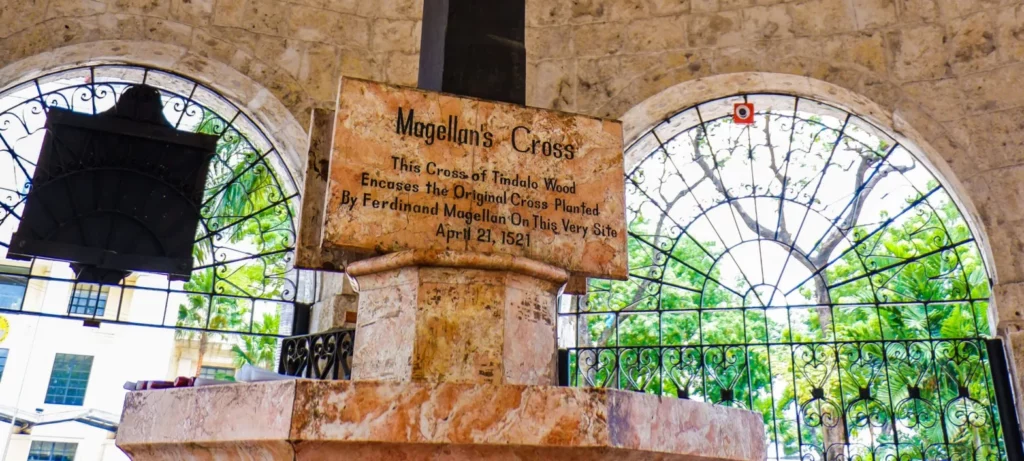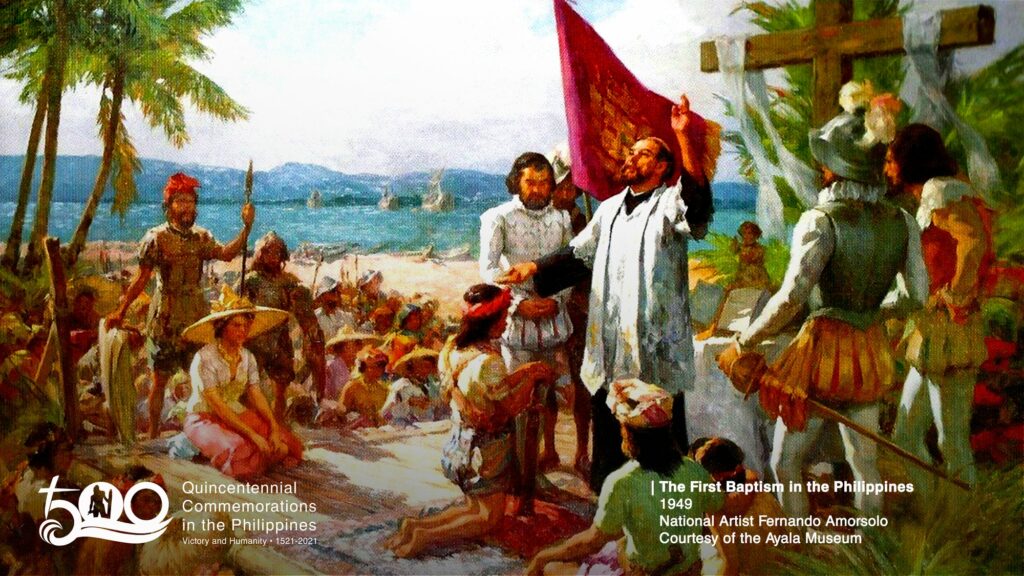On Sunday morning, April fourteen, forty men of us went ashore, two of whom were completely armed and preceded the royal banner. When we reached land all the artillery was fired. Those people followed us hither and thither. The captain and the king embraced. The captain told the king that the royal banner was not taken ashore except with fifty men armed as were those two, and with fifty musketeers; but so great was his love for him that he had thus brought the banner.
Then we all approached the platform joyfully. The captain and the king sat down in chairs of red and violet velvet, the chiefs on cushions, and the others on mats. The captain told the king through the interpreter that he thanked God for inspiring him to became a Christian; and that he would more easily conquer his enemies than before. The king replied that he wished to become a Christian, but that some of his chiefs did not wish to obey, because they said that they were as good men as he.
Then our captain had all the chiefs of the king called, and told them that, unless they obeyed the king as their king, he would have them killed, and would give their possessions to the king. They replied that they would obey him. The captain told the king that he was going to Spain, but that he would return again with so many forces that he would make him the greatest king of those regions, as he had been the first to express a determination to become a Christian. The king, lifting his hands to the sky, thanked the captain, and requested him to let some of his men remain [with him], so that he and his people might be better instructed in the faith. The captain replied that he would leave two men to satisfy him, but that he would like to take two of the children of the chiefs with him, so that they might learn our language, who afterward on their return would be able to tell the others the wonders of Spain.
A large cross was set up in the middle of the square. The captain told them that if they wished to become Christians as they had declared on the previous days, that they must burn all their idols and set up a cross in their place. They were to adore that cross daily with clasped hands, and every morning after their [i.e., the Spaniards’] custom, they were to make the sign of the cross (which the captain showed them how to make); and they ought to come hourly, at least in the morning, to that cross, and adore it kneeling.

The intention that they had already declared, they were to confirm with good works. The king and all the others wished to confirm it thoroughly. The captain-general told the king that he was clad all in white to demonstrate his sincere love toward them. They replied that they could not respond to his sweet words. The captain led the king by the hand to the platform while speaking these good words in order to baptize him. He told the king that he would call him Don Carlo, after his sovereign the emperor; the prince, Don Fernando, after the emperor’s brother; the king of Mazaua, Johanni; a chief, Fernando, after our chief, that is to say, the captain; the Moro, Christoforo; and then the others, now one name, and now another.
Five hundred men were baptized before mass. After the conclusion of mass, the captain invited the king and some of the other chiefs to dinner, but they refused, accompanying us, however, to the shore. The ships discharged all the mortars; and embracing, the king and chiefs and the captain took leave of one another.
After dinner the priest and some of the others went ashore to baptize the queen, who came with forty women. We conducted her to the platform, and she was made to sit down upon a cushion, and the other women near her, until the priest should be ready.

She was shown an image of our Lady, a very beautiful wooden child Jesus, and a cross. Thereupon, she was overcome with contrition, and asked for baptism amid her tears. We named her Johanna, after the emperor’s mother; her daughter, the wife of the prince, Catherina; the queen of Mazaua, Lisabeta; and the others, each their [distinctive] name. Counting men, women, and children, we baptized eight hundred souls.
The queen was young and beautiful, and was entirely covered with a white and black cloth. Her mouth and nails were very red, while on her head she wore a large hat of palm leaves in the manner of a parasol, with a crown about it of the same leaves, like the tiara of the pope; and she never goes any place without such a one. She asked us to give her the little child Jesus to keep in place of her idols; and then she went away.
In the afternoon, the king and queen, accompanied by numerous persons, came to the shore. Thereupon, the captain had many trombs of fire and large mortars discharged, by which they were most highly delighted. The captain and the king called one another brothers. That king’s name was Rajah Humabon.
Before that week had gone, all the persons of that island, and some from the other island, were baptized. We burned one hamlet which was located in a neighboring island, because it refused to obey the king or us. We set up the cross there for those people were heathen. Had they been Moros, we would have erected a column there as a token of greater hardness, for the Moros are much harder to convert than the heathen.
